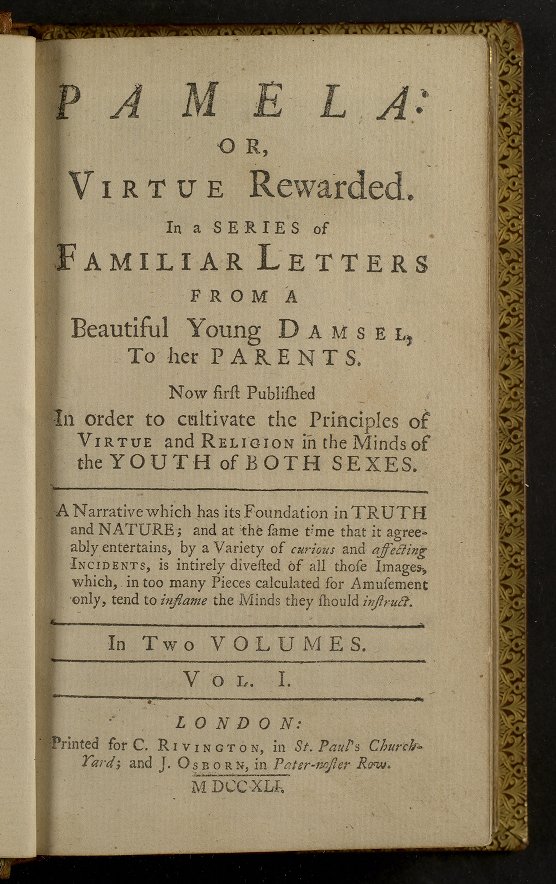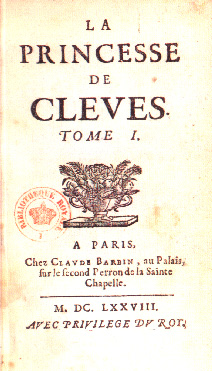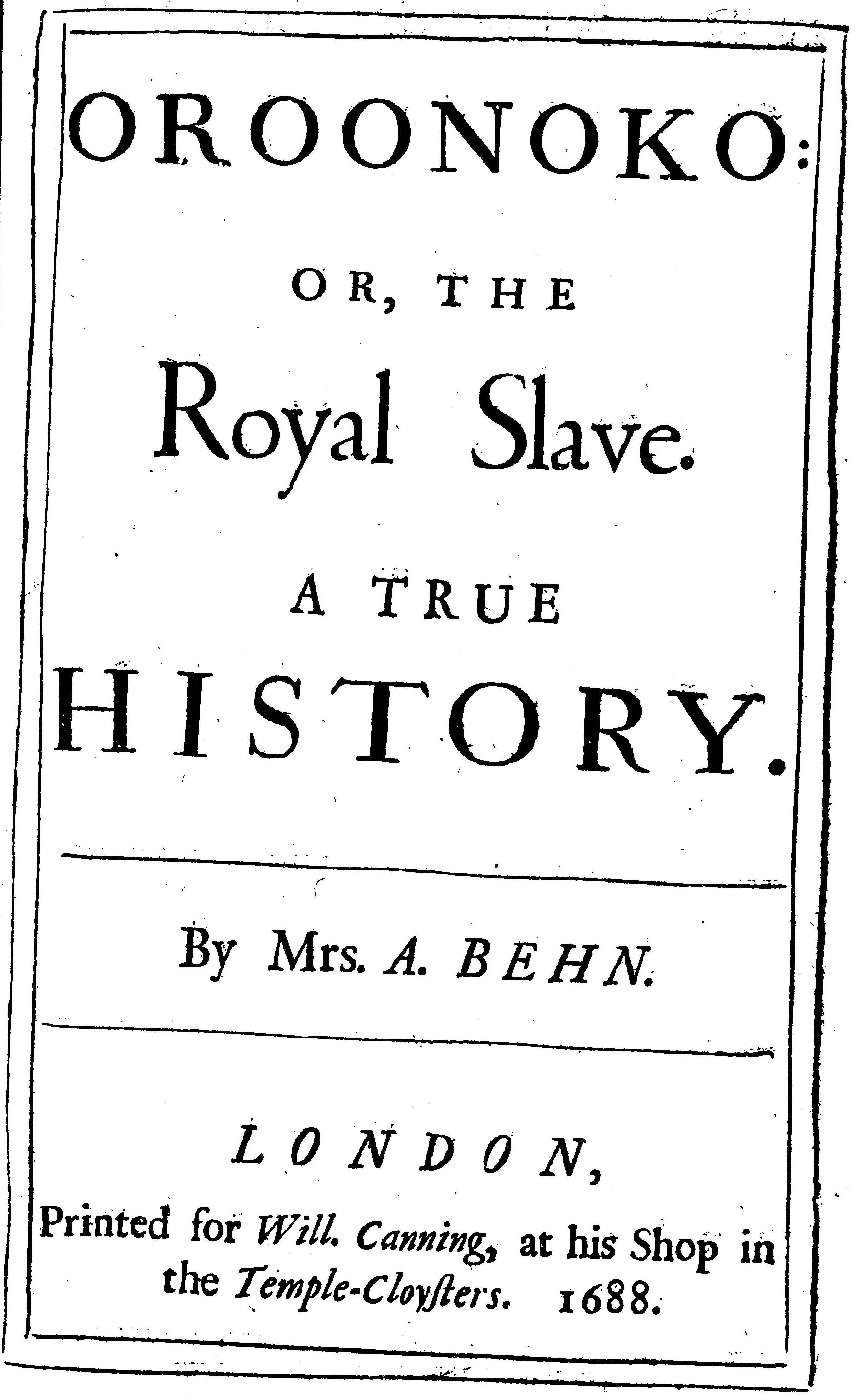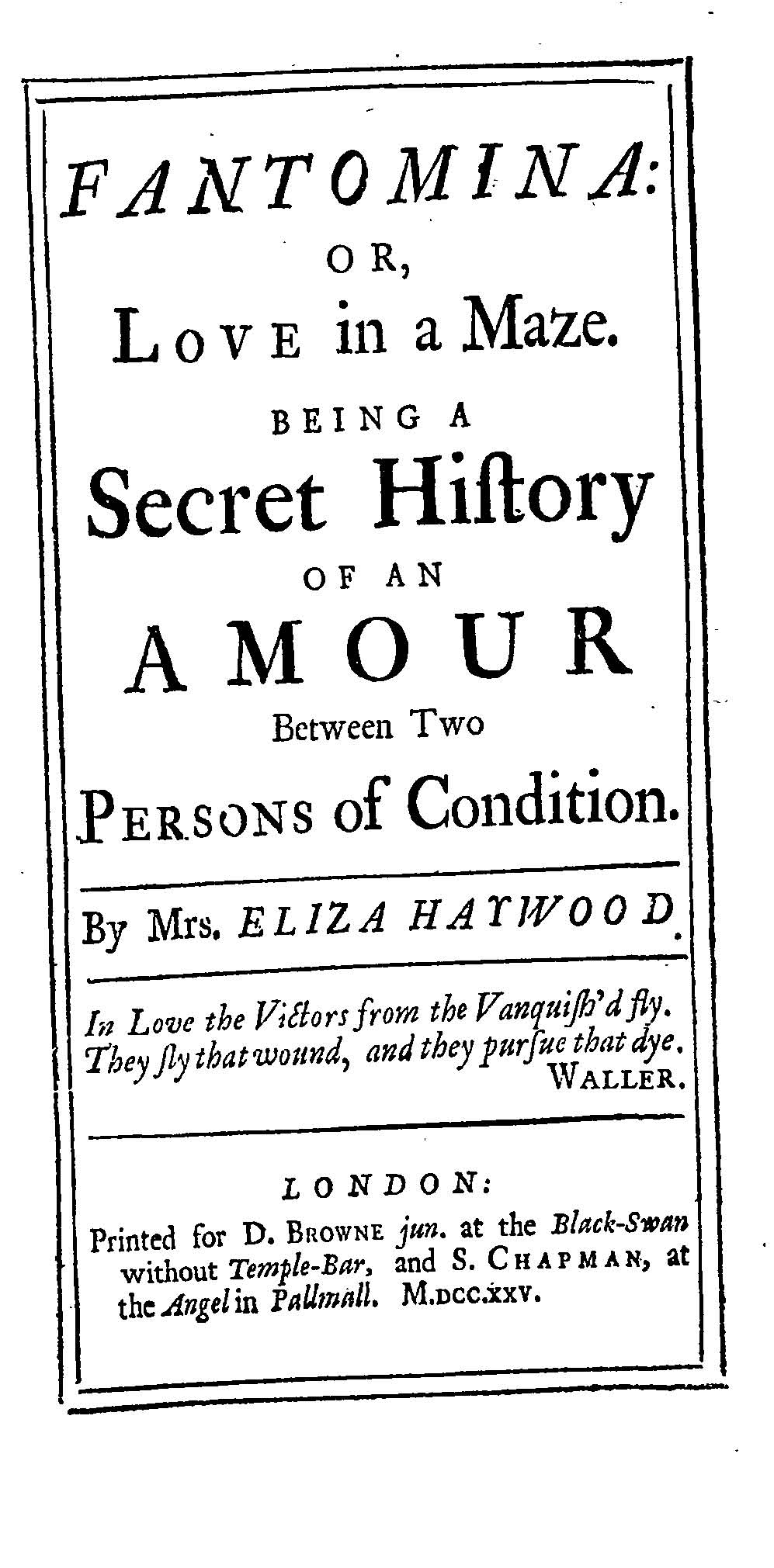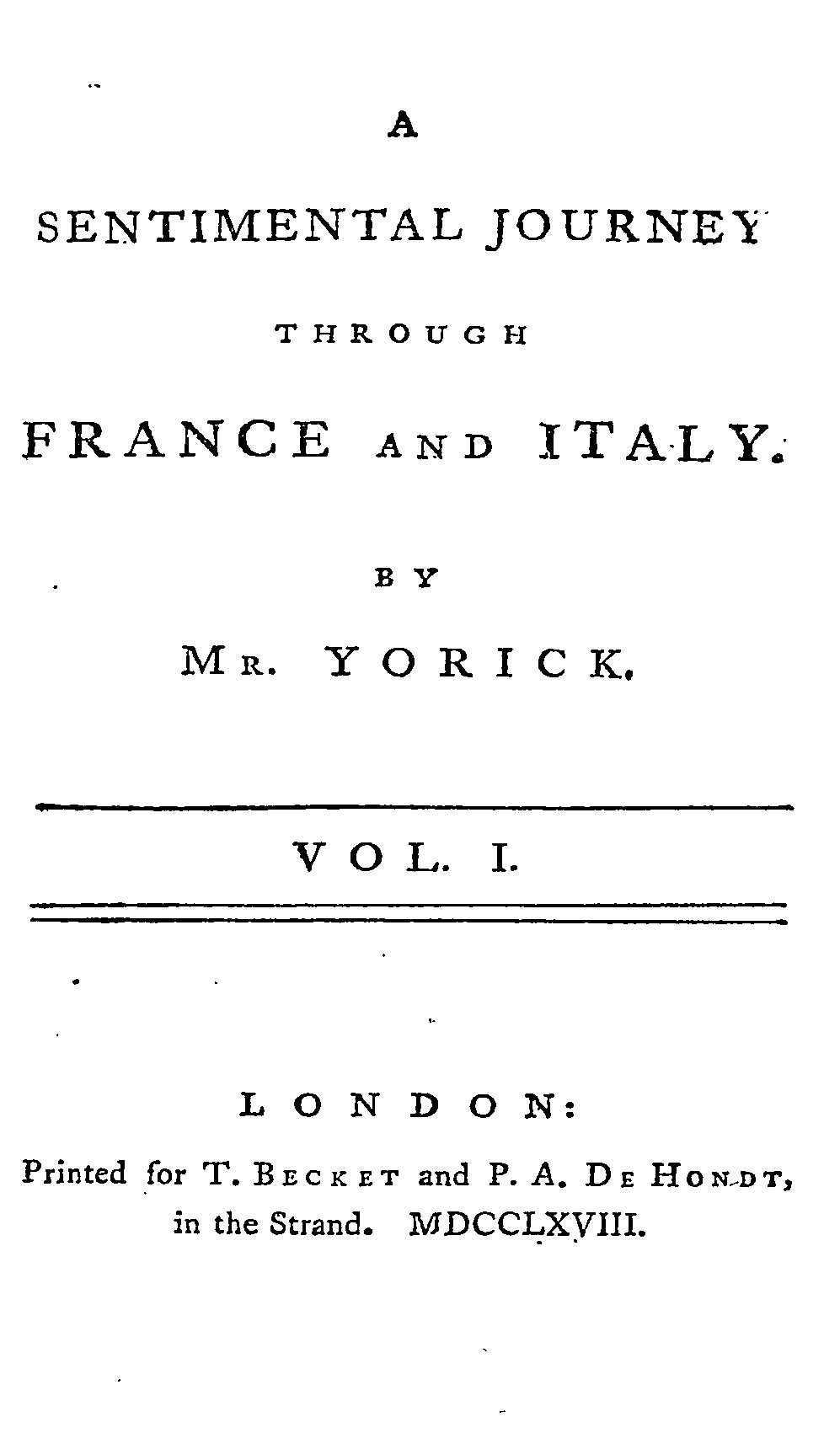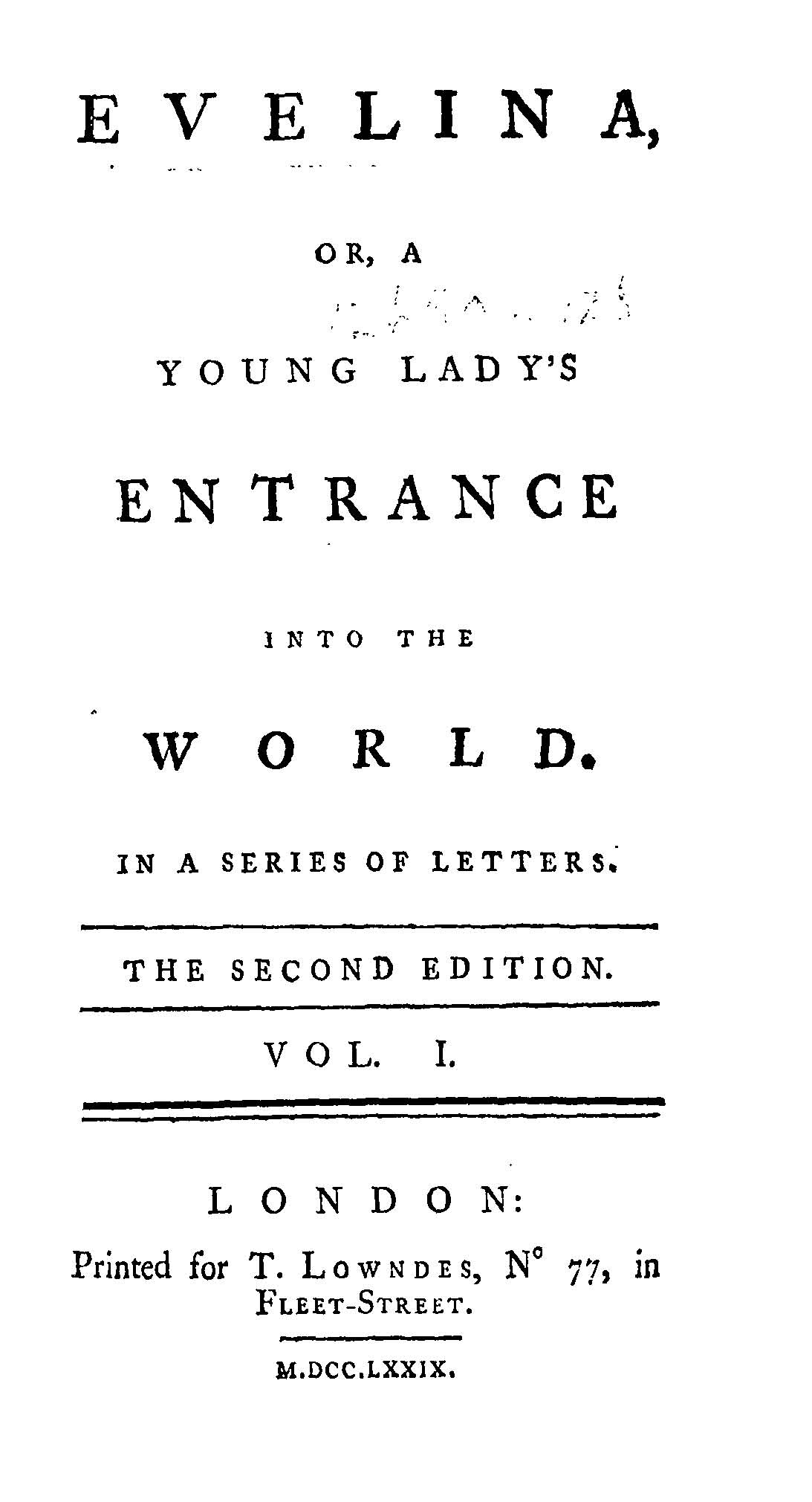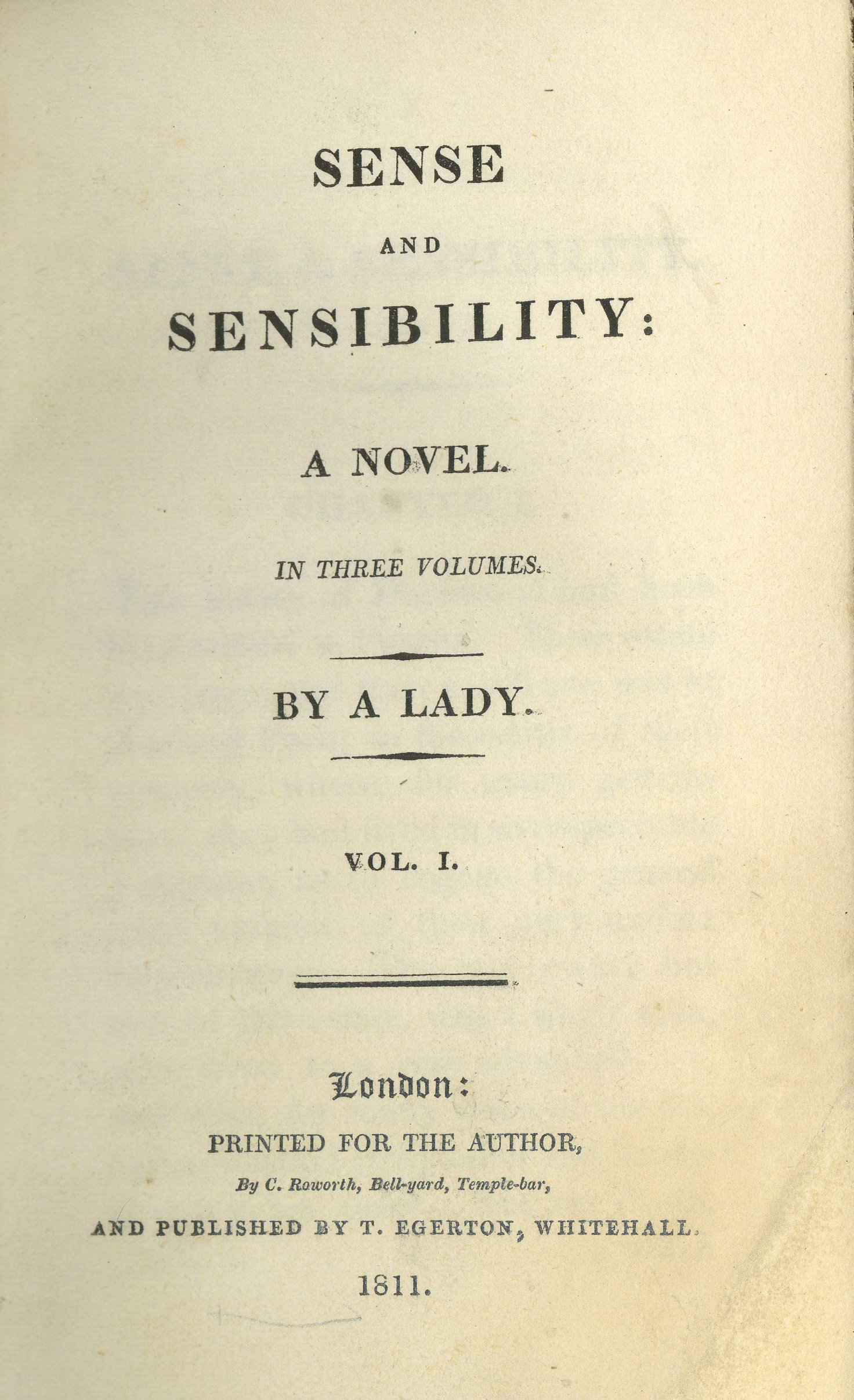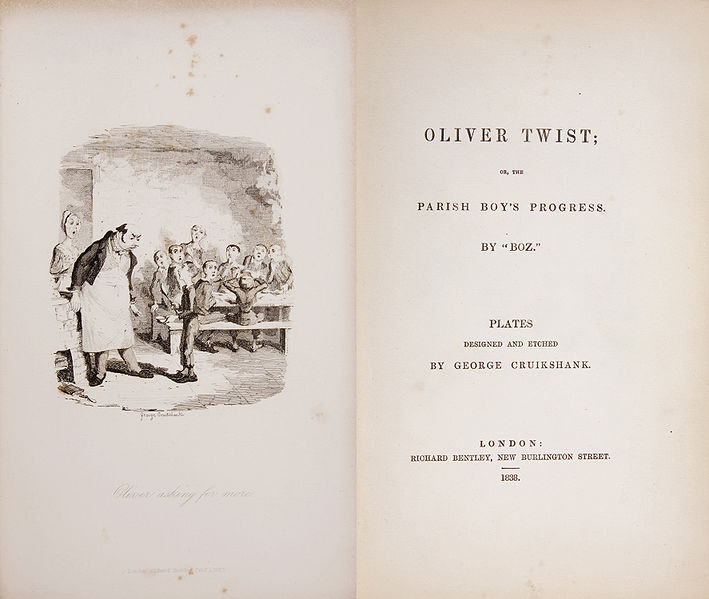The Novel in the History of Mediation
| Schedule | Early Editions | Articles | Resource Links | Bibliography |
English 232/ Comp Lit 236 Seminar Schedule, Spring 2011
Preferred editions for this seminar
I: (3/31) Introduction and discussion of the rise of the novel:
Question: "What is the novel?
The three most influential paradigms for the study of the novel:
- mimesis
- entertainment
- rhetoric
Historical vectors: in what ways did the women and men of the long 18th century understand the novel?
SlideShare PowerPoint, "The Rise of the Novel" (the traditional story) versus a map: "The History of Science Fiction" Whale-squid
Warner Notes
II: (4/7) Theoretical and historical framing
Questions: What is the history of mediation? What is Enlightenment? What is an actor-network?What do novels have to do with the Enlightenment?
Bruno Latour, Reassembling the Social, 1-86, 159-362. Report on Latour by Kyle Bucy
Clifford Siskin & William Warner, This is Enlightenment: “Introduction: this is Enlightenment,” 1-33.
Ian Watt, The Rise of the Novel, chapter 1 ("Realism and Novel Form") and chapter 2 "The reading public and the rise of the novel", 9-59.
Reports by Lizzie Callaway, Watt, chapter 1; PowerPoint: Roberta Wolfson, Watt, chapter 2
Event: "the Enlightenment is an ‘event in the history of mediation"
Modern critical:
Guillory, “Enlightening Mediation,” This is Enlightenment, 37-63.
For Seminar: Bruno Latour Handout: warm-up overview & Latour applied to the novel
Warner PP: This is Enlightenment & ANT Visualization of the Rise of the novel
III: (4/14) The novel of the 17th century
The question of origins: where does 'the novel' begin? How is it related to the romance and the novella?
Mme. de Lafayette, The Princess of Cleves (French 1678) (Gutenberg edition in html) Report by Judith Paltin
Aphra Behn, Oroonoko, or, The Royal Slave (1688)
Context: Nixon: Behn, Preface(1688), 63-65; Congreve, Preface to Incognita (1690), 77-79; Mary Astell, 258-259; Judith Drake, 259-260; Pierre-Daniel Huet, History of Romance, 336-343.
Event: lapse of the licensing act in 1695 and the development of printing in England
Modern Critical:
Lyons, John D. "The Emergence of the Novel."
Moretti, Franco. Graphs, Maps, Trees, 1-33
For Seminar: Warner PP: The Historical Frame of La Princesse de Cleves.
Warner PP:The Communication Circuits of La Princess de Cleves
IV: (4/21) Formula Fiction and Richardson’s ‘overwriting’ of the novel of amorous intrigue: Questions: Why does Pamela become a 'media event'? How does Richardson change the novel?
Eliza Haywood, Fantomina: or, Love in a Maze (1725)
Samuel Richardson, Pamela or, Virtue Rewarded (1740) Report by Bethany Wong
Samuel Richardson, Familiar Letters (1741), the kernel of the Pamela story (#138-139)
Context: Nixon: Aubin, Preface (1721), 66-67; Manley, Preface (1705), 99-104; Defoe, Preface (1722), 104-107; Illustrations for Pamela: Janet Aikins Yount
Event: the Postal law of 1710
Modern Critical:
Selection from Warner,W. Licensing Entertainment, chap 1, 1-44.
Nixon, Cheryl. Novel Definitions, Introduction 15-57,
Watt, Ian. Rise chapter 5 ("Love and the Novel: Pamela") 135-173.
For Seminar: Pamela and Literary History of the Novel
V: (4/28) Elevating the novel: Questions:What is the effect of splicing Cervantes into the history of the English novel with Joseph Andrews? How does it produce an alternative to Richardson?
Fielding, Shamela (1741) & Joseph Andrews (1742) Report by Michael Grafals.
Bakhtin, The Dialogic Imagination, selections by McKeon.
Context: Cervantes, Don Quixote, Smollett Translation (1755): Vol. 1: 1-49; 49-99; 100-149; Vol. 2: 1-49
Fielding, “An enquiry into the causes of the late increase of robbers; etc.” (1751),
Rambler #4 (Saturday, 31 March 1750),
Modern Critical:
Michael McKeon, Mediation as Primal Word, This is Enlightenment, 384-412
John Bender, Novel Knowledge, This is Enlightenment, 284-300.
Moretti, Franco. “History of the Novel, Theory of the Novel,” Novel: a Forum in Fiction, 43:1, 1-10. THE NOVEL. 2 vols. Table of Contents and Preface.
Black, Scott. “Quixotic Realism and the Romance of the Novel.” Novel: A Forum in Fiction, 42:2, 239-244.
Bakhtin and Joseph Andrews
For Seminar: Warner PP: The Elevation of the Novel: Richardson and Fielding
Joseph Andrews: Discussion Handout
VI: (5/5)The Novel and the turn toward Sentiment: Questions: What is sentimentalism in Sterne? How does sentimentalism become part of the history of the novel? How does Austen critique but also incorporate sentimentalism?
Sterne, A Sentimental Journey (1768)
Context:
Nixon, Book Reviews of Tristram Shandy in the Monthly Review and Critical Review, 283-287
Austen, Sense and Sensibility (1811)
Event: Monthly Review (1749—Ralph Griffiths) and Quarterly Review (1756—Tobias Smollett)
Modern Critical:
Armstrong, Nancy. “The Fiction of Bourgeois Morality and the Paradox of Individualism.” Report by Lizzie Callaway
Moretti, Novel, II: 349-388. Ed. NOVEL: A FORUM IN FICTION. Tables of Contents to 3 special issues on the history and theory of the novel.
Kennedy, Meegan. "Some Body's Story: the Novel as Instrument." Novel: a Forum in Fiction. 42:3, 451-459.
Recommended: R.S. Crane. Towards a Genealogy of a 'Man of Feeling'
For Seminar: Warner PP:Sterne and Sentiment
Burney, Evelina (1779) Report by Bethany Wong
Contexts:
Nixon: Commentary: Skelton, Hawkesworth, Moore, Goldsmith), 203-217; Thomas Wilson, “The use of circulating libraries,” 221-3; Reviews of Evelina, 288-290.
Event: Copyright law of Queen Anne of 1710 and Mansfield decision of 1774
Modern Critical:
Lynch, Deidre."Agoraphobia and Interiority in Frances Burney's Fiction". from The Economy of Character: Novels, Market Culture, and the Business of Inner Meaning. Chicago: U of Chicago Pr., 1998. 164-207. Report by Roberta Wolson
Recommended. Lynch, Deidre. Jane Austen and the Social Machine.
Recommended: Mark Rose, "Authors as Proprietors"
Recommended: William St. Clair, "The Political Economy of Reading"
Light reading recommendaation: William Warner: "I shop therefore I am: the new scholarship on 18th century consumption"
For Seminar: Warner PP on Evelina
VIII: (5/19) The Novel, Anthology, and Literature: Questions: What is the effect of anthologizing the (eighteenth century) novel? How does the novel become the narrative of nations?
Scott, Waverley (1814)
Contexts:
Nixon: the debate about novels: Hugh Blair (1783), 343-346; James Beattie (1783), 347-350; Clara Reeve (1785), 350-358.
Recommended: Scott review of Austen’s Emma (1815), Nixon, 306-310.
Events: invention of the steam powered press (Koenig, 1810) and the steam powered rotary press (Hoe, 1843); Anthologies of the novel by Sir Walter Scott and Anna Letitia Barbauld, British Novelists (1810), Nixon, 361-369.
Modern Critical:
Bakhtin: Report by Kyle Bucy
Leah Price, The Anthology and the Rise of the Novel: from Richardson to George Eliot. Chapter 1. Chapter 1, Part 2.(Cambridge: Cambridge UP, 2000) Report by Atsuro Misoe
Recommended: Duncan, Ian. “Waverley (Walter Scott, 1814)" in Moretti, Novel, II: 173-180
Recommended: Trumpener, Katie. Bardic Nationalism: the romantic novel and the British Empire. Chapter 3. Princeton: Princeton UP, 1997.
For Seminar: Warner PP: Scott and Scotland
IX: May 26: Synthetic Discussion of the Theory of the Novel: Latour, Watt, Armstrong, Bakhtin, Moretti
In this seminar, we have read a variety of theorists whose work helps us to understand the history and theory of the novel. Please review these thinkers and consider these questions. How would you compare the conceptual premises and guiding purposes of these distinctly different approaches to society, history and the novel? Please review the basic concepts of Latour ("actor-network"; mediation); Watt ("formal realism"), Bakhtin ("heteroglossia," "dialogism"), Armstrong ("individualism," "society"), Moretti ("quantification," "distance reading," "visualization").
Assignment: choose one paragraph from one theorist so as to open a discussioin in the seminar. You might expound the meaning and usefulness of the passage and/or pose questions about its meaning to which other seminar members can respond.
Context: Modern Theories of the Novel
Modern Critical:
Bruno Latour, Reassembling the Social, 1-86, 159-362.
Ian Watt, The Rise of the Novel, chapter 1 ("Realism and Novel Form") and chapter 2 "The reading public and the rise of the novel", 9-59.
Armstrong, Nancy. “The Fiction of Bourgeois Morality and the Paradox of Individualism.”
Bakhtin, The Dialogic Imagination, selections by McKeon.
Moretti, Franco. ed. THE NOVEL. 2 vols. Preface and Table of Contents.
____. "Network Theory, Plot Analysis. New Left Review 68, Mar April 2011. 80-102.
____.“History of the Novel, Theory of the Novel,” Novel: a Forum in Fiction, 43:1, 1-10.
____ THE NOVEL. 2 vols. Table of Contents and Preface.For Seminar: Warner PP: A Topology of Theories of the Novel'
X: (6/2) Presentations by Seminar Members: I’m asking each of you to take 10 minutes to report on your paper
Seminar Paper Assignment
Due: 10th of June (but you can hand in earlier) •15 pages or more, plus works cited (MLA format)
•write on one novel from this seminar or, one close to these novels from the long 18th century
•work up a topic and read appropriate criticism and/or archival texts
•develop a reading of some aspect of the novel
•Caution: this is an apprentice piece. Please hand in your paper on time so we can all start summer!
|
Early Editions
(In the approximate order in which they will be read)
Aphra Behn, Oroonoko (1688)
Eliza Haywood, Fantomina: or, Love in a Maze (1725)
Samuel Richardson, Pamela (1741: 2nd edition)
Samuel Richardson, Familiar Letters (1741), the kernel of the Pamela story (#138-139)Henry Fielding, Shamela (1741) & Joseph Andrews (1742)
Denis Diderot: "Eloge de Richardson" in Journal etranger, Jan. 1762 (WBW selections)
Henry Fielding,“An enquiry into the causes of the late increase of robbers; etc.” (1751)
Samuel Johnson, Rambler #4 (Saturday, 31 March 1750),
Lawrence Sterne, A Sentimental Journey Through France and Italy, by Mr. Yorick (1768)
Frances Burney, Evelina; or, A Young Lady's Entrance into the World. In a series of Letters. (2nd edition, 1779)
Jane Austen,
Northanger Abbey (1818/1808)(Gutenberg)
Sense and Sensibility (1811) (Gutenberg)
Pride and Prejudice (1813) (Austen.com)
Mansfield Park (1814)(Austen.com) with the Inchbald play Lover's Vows
Emma (1815)(Austen.com)
Persuasion (1818)(Austen.com)
Juvenilia found on this Short Table of Contents (Pemberley.com)
Sir Walter Scott: Quarterley Reivew of Emma (January, 1821) (Project Gutenberg)
William Hogarth: The
Harlot's Progress (Wikipedia)
Articles and Book Chapters
Armstrong, Nancy. “The Fiction of Bourgeois Morality and the Paradox of Individualism.” Moretti, Novel, II: 349-388
____. Ed. NOVEL: A FORUM IN FICTION. 3 Special Issues. Tables of Contents
Black, Scott. “Quixotic Realism and the Romance of the Novel.” Novel: A Forum in Fiction, 42:2, 239-244.
Cohn, Dorrit: "Transparent Minds: Narrative Modes for Presenting Consciousness in Fiction"
Duncan, Ian. “Waverley (Walter Scott, 1814)" in Moretti, Novel, II: 173-180
Levine, Caroline. "Narrative Networks: Bleak House and the Affordances of Form." Novel: A Forum in Fiction, 42:3 517-523.
Lynch, Deidre."Agoraphobia and Interiority in Frances Burney's Fiction," from The Economy of Character: Novels, Market Culture, and the Business of Inner Meaning. Chicago: U of Chicago Pr., 1998. 164-207.
_____. "Jane Austen and the Social Machine," from The Economy of Character, Chicago: U of Chicago Press, 1998, 207-239.)
Lyons, John D. "The Emergence of the Novel." From A New History of French Literature. Ed. Denis Hollier. Cambridge, Mass: Harvard UP, 1998. 350-354.
Kennedy, Meegan. "Some Body's Story: the Novel as Instrument." Novel: a Forum in Fiction. 42:3, 451-459.
Moretti, Franco. “History of the Novel, Theory of the Novel,” Novel: a Forum in Fiction, 43:1, 1-10.
____. Graphs, Maps, Trees, 1-33
____. ed. THE NOVEL. 2 vols. Preface and Table of Contents
____. "Network Theory, Plot Analysis. New Left Review 68, Mar April 2011. 80-102.
Price, Leah. The Anthology and the Rise of the Novel: from Richardson to George Eliot. Chapter 1. Chapter 1, Part 2. Cambridge: Cambridge UP, 2000.
Rose, Mark. "Authors as Proprietors"
Siskin, Clifford & William Warner, This is Enlightenment: “Introduction: this is Enlightenment,” 1-33. Chicago: University of Chicago Press, 2010.
St. Clair, William. "The Political Economy of Reading"
Trumpener, Katie. Bardic Nationalism: The Romantic Novel and the British Empire. Chapter 3, "National Character". Princeton: Princeton UP, 2000.
Watt, Ian. The Rise of the Novel, chapters 1 "Realism and Novel Form" & 2 "The reading public and the rise of the novel", 9-59, and chapter 5 "Love and the novel, 135-173.
Jane Austen Articles
Johnson,Claudia. "Not at all what a man should be!": Remaking English Manhood in Emma," in Equivocal Beings: Politics, Gender, and Sentimentality in 1790s (Chicago: Univ of Chicago P, 1995), 191-201.
Knox-Shaw, Peter. "Emma and the flaws of Sovereignty," (in Jane Austen and the Enlightenment, Cambridge: Cambridge UP, 2004, 197-219)
Tanner, Tony. "Secrecy and Sickness: 'Sense and Sensibility'" (from Jane Austen, Cambridge, Mass: Harvard: 1986, 75-102.
Tanner, Tony. "Knowledge and Opinion: 'Pride and Prejudice'", (from Jane Austen, Cambridge, Mass: Harvard, 1986, 75-102)
Zunshine, Lisa. "Why Jane Austen Was Different, and Why We May Need Cognitive Science to See It."
Resource Links
Useful Links
General Research Resources (accessible through UCSB Davidson Library proxy server): OED, Historical Dababases; e-journals; etc.
Title pages of 18th and 19th century novels
Pemberly.com - Wealth of online resources about Jane Austen
Austen Society of North America - "Dedicated to the study and celebration of the classic English author. Find out how to join the Society, or order journals and newsletters."
Stanford Center for the Study of the Novel
Clarissa, 3rd edition http://www.english.upenn.edu/Projects/Clarissa/3rdEdition
Homegrown Resources
[These notes and questions were developed for students of the rise of the novel in Britain--WBW]General Paradigms for Interpreting Novels
The Pamela Media Event (1740-1742)
Bakhtin and Joseph Andrews
Jane Austen & Mansfield Park & Persuasion : notes and questions on Cohn, Said, Trilling, Anderson, Lynch, Galeprin
Bibliography
Novel as Print Media Culture: Bibliography Fall,
1995 Anderson, Benedict. Imagined
Communities: Reflections on the Origin and Spread of Nationalism
(London: Verso, 1991) Revised edition. Armstrong, Desire and
Domestic Fiction. (Oxford: Oxford UP, 1987.) Armstrong, Nancy. Ed. Novel: A Forum on Fiction. Theories of the Novel Now, Part I (Summer 2009); Part II (Fall 2009); Part III (Spring 2010) Armstrong, Nancy. “The Fiction of Bourgeois Morality and the Paradox of Individualism.” In Moretti, 2006, II: 349-388. Armstrong, Nancy and Tennenhouse,
Lenny. The Imaginary Puritan: Literature, Intellectual Labor,
and the Origins of Personal Life (Berkeley: U of California
P, 1992). Bakhtin, Mikhail M. Selections of The Dialogical Imagination. From Theory of the Novel: A Historical Approach. Ed. By Michael McKeon, Baltimore: Johns Hopkins UP, 321-353. Ballaster, Ros. Seductive
Forms: Women’s Amatory Fiction from 1684 to 1740. (Oxford: Oxford
UP, 1992.) Bender, John. Imagining
the Penitentiary (Chicago: U of Chicago P, 1987). Berlant, Lauren . Introduction to The Anatomy of National Fantasy: Hawthorne, Utopia, and Everyday Life. Chicago: U of Chicago Pr., 1991. 1-17. Brown, Laura. Ends of
Empire: Women and Ideology in Early Eighteenth-Century English Literature.
(Ithaca: Cornell UP, 1993).
Butler, Judith. Bodies
That Matter: On the Discursive Limits of “Sex” (New York: Routledge,
1993.) Campbell, Jill. Natural
Masques: Gender and Identity in Fielding’s Plays and Novels.
(Stanford: Stanford UP, 1995). Chartier, Roger. The
Order of Books: Readers, Authors, and Libraries in Europe between
the Fourteenth and Eighteenth Centuries Trans by Lydia G Cochrane.
(Stanford: Stanford UP, 1994.) Cohen, Margaret and Dever, Carolyn. Ed. The Literary Channel: the Inter-National Invention
of the Novel: Princeton: Princeton UP, 2002. Cohn, Dorrit ."Transparent Minds: Narrative Modes for Presenting Consciousness in Fiction" from McKeon, Theory, 493-515. Davidson, Cathy. Revolution
and the Word: the Rise of the Novel in America. (New York: Oxford
UP, 1986. DeCerteau, Michel. The
Practice of Everyday Life Trans. By Steven F. Rendall. (Berkeley:
U of California P, 1984. ) Duncan, Ian. “Waverley (Walter Scott, 1814),” in Moretti, 2006, II: 173-180. Feather, John. A History
of British Publishing. (London: Routledge, 1991) Festa, Lynn ."Sentimental Bonds and Revolutionary Characters: Richardson's Pamela in England and France", The Literary Channel, ed. Margaret Cohen and Carolyn Dever, Princeton: Princeton UP, 2002, 73-105. Gallagher, Catherine. Nobody’s
Story: the Vanishing Acts of Women Writers in the Marketplace 1670-1820.
(Berkeley: U of California P, 1994). Gardiner, Judith Kegan.
“The First English Novel: Aphra Behn’s Love
Letters, the Canon, and Women’s Tastes.” Tulsa Studies in
Women’s Literature. Volume 8, No 2. Fall 1985, 201-222. Goulemot, Jean Marie. Forbidden
Texts: Erotic Literature and its Readers in Eighteenth Century France.
Philadelphia: U of Pennsylvania P, 1994. Gwilliam, Tassie. Samuel
Richardson’s Fictions of Gender.
(Stanford: Stanford UP, 1993.) Hunter, J. Paul. Before
Novels: the Cultural Contexts of Eighteenth Century English Fiction.
New York: Norton, 1990.
International Encyclopedia
of Communications Oxford University
Press: New York, 1989. Johnson, Claudia. Equivocal Beings: Politics, Gender, and Sentimentality in 1790s. (Chicago: Univ of Chicago Pr, 1995) Laclau, Ernesto and Mouffe,
Chantal. Hegemony & Socialist Strategy: Towards a Radical
Democratic Politics. (London: Verso, 1985). Lynch, Deidre."Introduction" to Janeites: Austen's Disciples and Devotees, Princeton: Princeton UP, 2000. Table of contents, 3-24. ____. The Economy of Character: Novels, Market Culture, and the Business of Inner Meaning.Chicago: U of Chicago Press, 1998 Kernan, Alvin. Samuel
Johnson & the Impact of Print. (Princeton: Princeton UP,
1987) Knox-Shaw, Peter. Jane Austen and the Enlightenment, Cambridge: Cambridge UP, 2004. Marshall, David. "True Acting and the Language of Real Feeling: Mansfield Park", from Varieties of Aesthetic Experience (forthcoming) Matthiessen, F. O. Selection from American Renaissance. London: Oxford UP, 1941. 242-282 McLuhan, Marshall. The
Gutenberg Galaxy: the Making of Typographical Man. (Toronto:
U of Toronto P, 1962). Moretti, Franco. "Graphs, Maps, Trees: Abstracts
Models for Literary History", New
Left Review 24, November-December 2003.
_____. "The novel, the nation state", in Atlas of the European Novel: 1800-1900. London: Verso, 1998. 10-47. Moretti, Franco. Ed. The Novel. Volume I: History, Georgaphy, and Culture. Princeton: Princeton UP, 2006. _____. Ed. The Novel. Volume II: Forms and Themes. Princeton: Princeton UP, 2006. Paulson, Ronald. Hogarth:
the Modern Moral Subject (1697-1732)
(New Brunswick: Rutgers UP). Price, Leah. The Anthology and the Rise of the Novel: from Richardson to George Eliot. Cambridge: Cambridge UP, 2000. Rose, Mark. Authors
and Owners: the Invention of Copyright. (Cambridge: Harvard
UP, 1993.) Roussel, Roy. The Conversation
of the Sexes, “Fanny Hill and the Androgenous Reader.”
(New York: Oxford UP, 1986). Said, Edward. Culture and Imperialism. New York: Alfred A. Knopf, 1993. i-xxviii; 62-97. Tanner, Tony. Jane Austen. Cambridge, Mass.: Harvard UP, 1986. Trumpener, Katie. Bardic Nationalism: the romantic novel and the British Empire. Princeton: Princeton UP, 1997. Turner, Cheryl. Living
by the Pen: Women Writers in the Eighteenth Century. (London:
Routledge, 1992).
James Grantham Turner:
“Novel Panic: Picture and Performance in the Reception of Richardson’s
Pamela” in Representations 48. (Berkeley: U of California
P, 1994).
Warner, William B. Licensing Entertainment: the Elevation of Novel Reading
in Britain, 1684-1750. Berkeley: U of California Pr., 1998. _____ “Licensing Pleasure”
in The Columbia History of the British Novel. Ed. John Richetti.
New York: Columbia UP, 1994, 1-22.
Watt, Ian. The Rise
of the Novel (Berkeley: U of California P, 1957)
Woodmansee, Martha. “Toward
a Genealogy of the Aesthetic: the German Reading Debate of the 1790s.”
Cultural Critique, 11 (Winter 1988-1989). 203-221.
|
Latour, Bruno. Reassembling the Social: An Introduction to Actor-Network Theory. Oxford: Oxford UP, 2007. Paperback. ISBN-10: 0199256055 ISBN-13: 978-0199256051
Nixon, Cheryl. L. Novel Definitions: An Anthology of Commentary on the Novel: 1688-1815. Toronto: Broadview Press, 2009. Paperback. ISBN-10: 1551116464 ISBN-13: 978-1551116464
Siskin, Clifford and Warner, William. This is Enlightenment. Chicago: U of Chicago Pr. 2010
Mme. De Lafayette. Princess de Cleves. Publisher: Penguin Classics; First Edition edition (October 6, 1992) Language: English ISBN-10: 0140445870 ISBN-13: 978-0140445879
Richardson, Samuel. Pamela: Or, Virtue Rewarded. Publisher: Oxford University Press, USA (July 12, 2001)
Language: English
ISBN-10: 0192829602
ISBN-13: 978-0192829603
Fielding, Henry. Joseph Andrews and Shamela. Publisher: Oxford University Press, USA; Reissue edition (November 11, 2008)
Language: English
ISBN-10: 0199536988
ISBN-13: 978-0199536986 Burney,
Burney, Francis. Evelina. Publisher: Bedford/St. Martin's; First Edition edition (March 15, 1997) Language: English ISBN-10: 0312097298 ISBN-13: 978-0312097295
Sterne, Lawrence. A Sentimental Journey. Publisher: Oxford University Press, USA; New edition (December 15, 2008) Language: English ISBN-10: 0199537186 ISBN-13: 978-0199537181
Austen, Jane. Sense and Sensibility. Publisher: Broadview Press (April 3, 2001) Language: English ISBN-10: 155111125X ISBN-13: 978-1551111254
Scott, Sir Walter. Waverley. Publisher: Penguin Classics (February 26, 1981) Language: English ISBN-10: 0140430717 ISBN-13: 978-0140430714
Dickens, Charles. Oliver Twist. Hardcover: 608 pages Publisher: Penguin Classics Hardcover; Reprint edition (September 28, 2010) Language: English ISBN-10: 0141192496 ISBN-13: 978-0141192499
| UCSB English | Transcriptions | Early Modern Center with Links to Databases |
